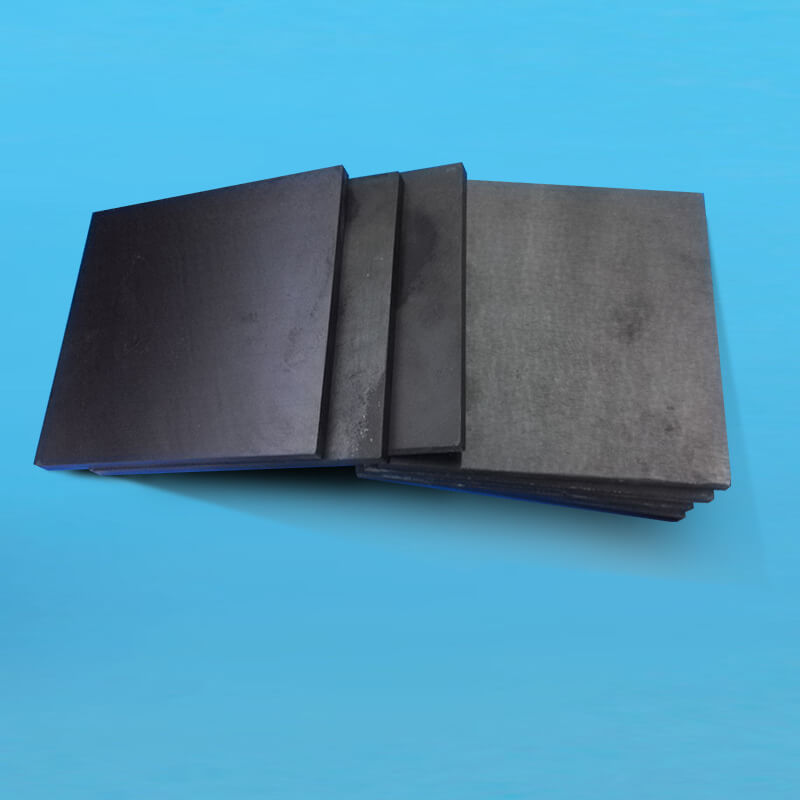Introduction of Silicon Nitride Ceramic Materials
Silicon nitride (Si3N4) offers excellent thermal shock resistance and high temperature strength, ideal for automotive engines, gas turbines, and aerospace applications. It’s used in turbocharger rotors, diesel engine glow plugs, and electrical connectors, providing long-term stability in high-temperature and high-pressure conditions.
E-mail:sales01@hkceramic.com

| Plate material mm (L, H, and W can be selected as needed, customization supported) | ||||||||||||
| L | 3 | 5 | 8 | 10 | 12 | 15 | 18 | 20 | 22 | 25 | 28 | More (Customizable) |
| W*H | 100*100 | 90*140 | 95*145 | 150*150 | 160*160 | 122*290 | 110*275 | More (Customizable) | ||||
| Rod material mm (W, Ø can be selected as needed, customization supported) | ||||||||||||
| Ø | 0.5 | 0.8 | 0.9 | 1 | 1.5 | 2 | 2.5 | 3 | 3.5 | 4 | 4.5 | More (Customizable) |
| W | 60 | 100 | 120 | 200 | More (Customizable) | |||||||
Silicon nitride (Si3N4) is an advanced engineering ceramic material known for its excellent high-temperature performance and superior mechanical properties.
1. High Strength and Fracture Toughness at High Temperatures
Silicon nitride exhibits high strength and excellent fracture toughness at elevated temperatures, making it an ideal choice for many high-temperature applications.
- Automotive Engine Components: Silicon nitride is widely used in high-temperature structural components of automotive engines such as piston rings, turbocharger turbine blades, and fuel injectors. Its high strength and wear resistance allow these components to operate stably in high-temperature, high-pressure, and harsh environments, thereby enhancing engine efficiency and reliability.
- Gas Turbine and Combustion Chamber Components: Silicon nitride is also extensively used in gas turbine and combustion chamber components such as turbine bearings, combustion chamber liners, and nozzles. Its high temperature strength and corrosion resistance enable these components to operate reliably in high-temperature and high-pressure environments, improving equipment performance and longevity.
2. Low Thermal Expansion Coefficient and Extremely High Thermal Shock Resistance
Silicon nitride features a low thermal expansion coefficient and extremely high thermal shock resistance, making it perform exceptionally well in high-temperature environments.
- Low Thermal Expansion Coefficient: The low thermal expansion coefficient of silicon nitride means it exhibits minimal deformation at high temperatures, making it particularly suitable for applications requiring stable dimensions and shapes, such as high-temperature furnaces and heat treatment equipment.
- Extremely High Thermal Shock Resistance: Silicon nitride demonstrates extremely high thermal shock resistance, maintaining its strength and integrity even under rapid temperature changes. This characteristic makes it highly beneficial for applications that undergo frequent temperature cycling, such as thermocouples and spark plug insulators.
The unique combination of properties in silicon nitride allows it to be widely used in high-temperature, high-pressure, and harsh environments. From the automotive industry to the energy sector, and from aerospace to industrial manufacturing, silicon nitride plays a crucial role in providing reliable material solutions for various high-temperature structural components. Its outstanding performance and durability not only enhance equipment efficiency and reliability but also drive technological advancement and innovation.
| Material Properties & Physical Performance | Units | Typical Values |
| Density | g/cm3 | >3.2 |
| Hardness | HRA90 | |
| Vickers Hardness (Hv50) | HV0.5 | >1550 |
| Modulus of Elasticity | Gpa | 290 |
| Flexural Strength | Mpa | >600 |
| Compressive Strength | Mpa | 2500 |
| racture toughness | Mpam1/2 | >6.0 |
| The rmodynamic property | Units | Typical Values |
| Maximum Use Temperature | ℃ | 1200 |
| Thermal Conductivity | W/(m·K) | 15-20 |
| Thermal Expansion Coefficient | 10-6/℃ | >3.1 |
| Thermal Shock Resistance | △T℃ | 500 |
| Specific Heat Capacity | KJ/kg.K | 700 |
| Electricl Protperties | Units | Typical Values |
| Dielectric Strength | KV/mm | 1 |
| Dielectric Constant | ||
| Volume Resistivity at 20°C | Ω.cm | 1.0×1012 |
*For more details, please feel free to contact our company.

High-Precision Alumina Ceramic Processing/Ceramic Accessories
Material:Alumina ceramics
Describe:High-Precision Alumina Ceramic Processing/Ceramic Accessories, also known as porous retaining rings, feature precise designs with drilled holes for secure connection. Their high hardness and strength ensure stability and durability under pressure, ideal for long-lasting equipment performance.
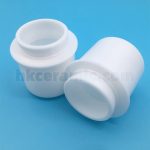
Customized Zirconia Ceramic Special-shaped Tubes
Material:Zirconia Ceramics
Describe:Customized zirconia (ZrO2) ceramic special-shaped tubes, also known as industrial ceramic threaded connecting tubes. Designed with precision threads for mechanical systems, these ceramic tubes ensure high-quality sealing and structural integrity. Their smooth surfaces reduce friction, optimizing fluid or gas flow efficiency.

Industrial Silicon Nitride Ceramic Ring
Material:Silicon Nitride Ceramics
Describe:Industrial Silicon Nitride Ceramic Ring for high-temperature environments like heat exchangers and combustion chambers. Ideal for lightweight, high-strength applications in semiconductor manufacturing and other industries, their chemical stability and low thermal expansion coefficient ensure superior mechanical and thermal performance.
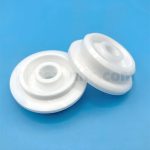
Zirconia ceramic insulator
Material:Zirconia Ceramics
Describe:Zirconia ceramic insulators with smooth surfaces and precise designs provide effective electrical insulation and stability. Their high hardness and strength maintain performance under high pressure and temperature, ensuring stable operation and equipment longevity.
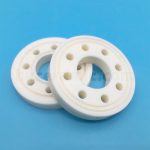
Alumina Ceramic Wheel
Material:Alumina ceramics
Describe:A wheel made of alumina (Al2O3) ceramic, also known as a porous ceramic sealing flange ring, is designed with multiple holes. These holes can be used for fastening or as part of fluid and gas channels, enhancing its functionality in sealing and fluid control systems. For example, these wheels can be installed at connection points in piping systems, serving as...
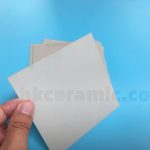
Aluminum nitride heat sink
Material:Aluminum Nitride Ceramics
Describe:Aluminum nitride (AlN) heat sink provides high thermal conductivity for efficient heat dissipation in semiconductor devices and LED lighting, enhancing equipment stability and performance.

